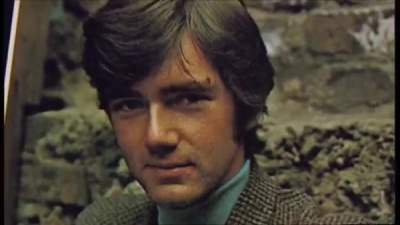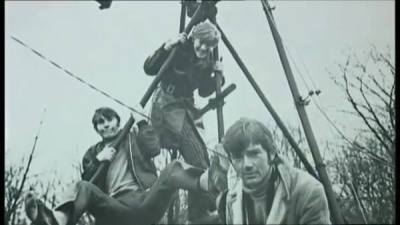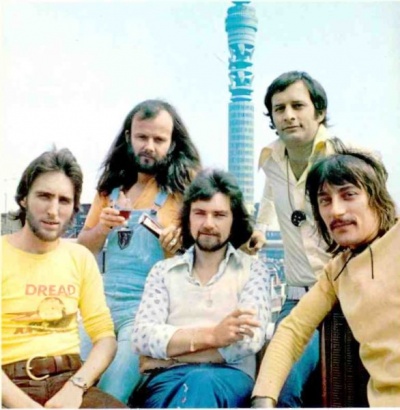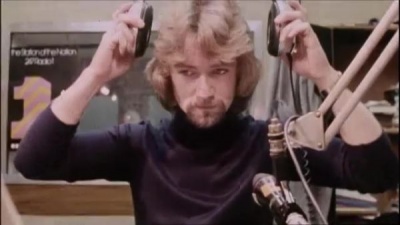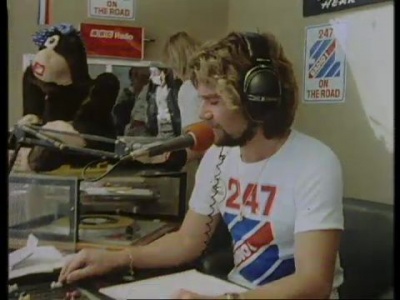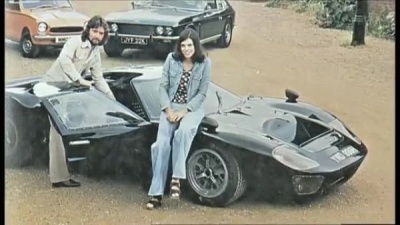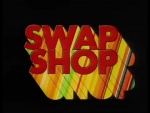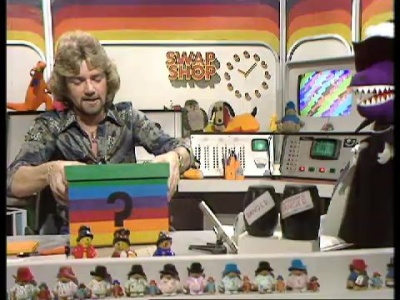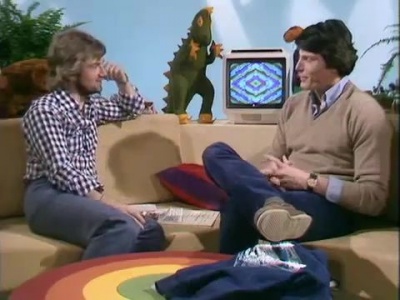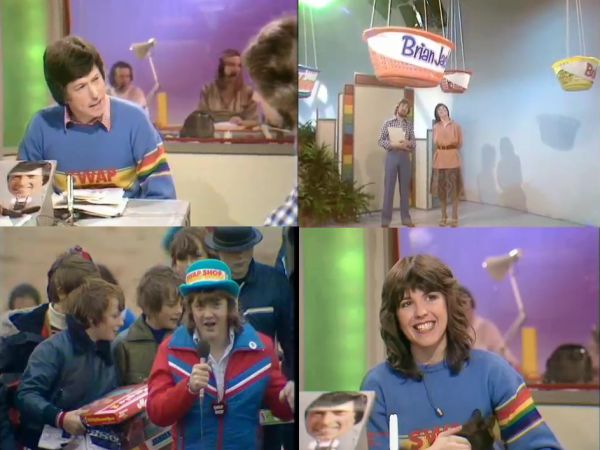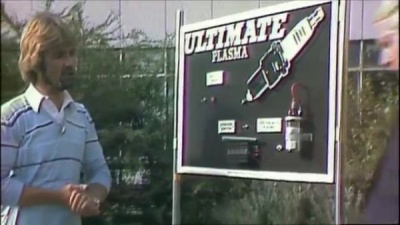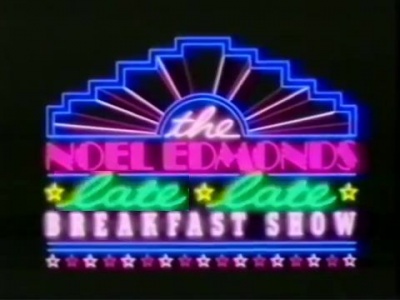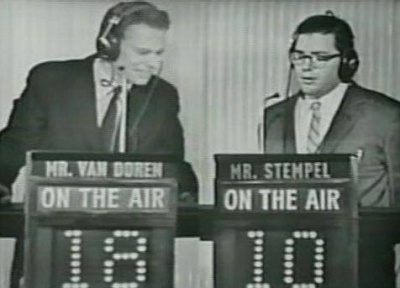Weaver's Week 2020-06-14
(Created page with 'Last week | Weaver's Week Index | Next week When we started plotting our next Living Legend profile, …') |
(→A beard for television: rm surplus 'he') |
||
| Line 111: | Line 111: | ||
</div> | </div> | ||
| - | When he appeared on ''Desert Island Discs'' in 1978, Noel told Roy Plomley that he'd miss the company; the solitude of being cast away on a desert island would get to him. Noel had moved to Suffolk, and while he'd miss the greenery, he wouldn't miss London. He was already a farmer, with some cows and sheep on his smallholding. When he finally left Radio 1, | + | When he appeared on ''Desert Island Discs'' in 1978, Noel told Roy Plomley that he'd miss the company; the solitude of being cast away on a desert island would get to him. Noel had moved to Suffolk, and while he'd miss the greenery, he wouldn't miss London. He was already a farmer, with some cows and sheep on his smallholding. When he finally left Radio 1, it was just about the end of his radio career - a week sitting in for Mike Read in 1985, eight weeks as a substitute for Johnny Walker in 2003, and no other regular gigs. |
<div class=image> | <div class=image> | ||
Revision as of 13:56, 14 June 2020
Last week | Weaver's Week Index | Next week
When we started plotting our next Living Legend profile, we thought it could be told in two weeks. We were wrong. We're dealing with a career, a talent, a topic of conversation that has to spill over three editions.
Contents |
The Life and Career of Noel Edmonds
A Beard for Radio
Noel Ernest Edmonds was born three days before Christmas 1948. His parents were Dudley Edmonds, a high school headteacher; and his wife Lydia, also a teacher. They had no other children. Noel was a child of London suburbia: he was raised in Hainault, attended Glade Primary in Clayhall, and then the private Brentwood School. He was a "medium" achiever, force-fed into his O-levels and A-levels, though with a genuine talent for History studies.
Noel was offered a place at Bristol University to read Economic History, but turned it down in favour of a year working in a primary school. He was then offered a place to read Human Relations at Surrey University in Guildford, but turned down the prospect of a "profession" in favour of somewhere even more dull.
Where is even more dull than Guildford? Luxembourg! From a very early age, Noel had been fascinated by radio, particularly by Kenny Everett, and chattered away to his toys and dolls. Practice made perfect, and Noel tried to climb aboard the pirate radio boom in 1967. His job with Radio 355 was over before it began, the pirates were busted by new laws. Instead, he made his way to Radio Luxembourg, a long-established broadcaster on land. Initially employed as a newsreader, Noel was not suited to this job, as demonstrated in his first bulletin.
Noel was reporting on an outbreak of the deadly disease typhoid in Italy. Several people had died and several hundred were ill in hospital; this is no joking matter. The last line caused Little Noely to collapse into a fit of giggles. "Authorities believe they have traced the source of the outbreak to an ice-cream vendor who has been washing his utensils in the Po". Luxy bosses were less amused, and shunted Noel to the job he wanted. He was allowed to present the records on the Very Late Shift, between 2 and 4 in the morning.
While at Luxembourg, Noel shared a flat with another fresh-faced presenter, David Jensen. He tried to make nicknames stick, and referred to David "Boyo" Jensen, before "Kid" happened. Noel also sprung a few pranks on Jensen, once he persuaded Jensen's girlfriend to pretend to be a corpse, complete with tomato ketchup as fake blood.
After nine months of this, Noel moved back to London, and BBC Radio 1. He was first employed to make trails for other programmes, sharp cutting to inject pace and vigour to the network. He took to the air in November 1969, sitting in when Mike Speake took a week off. Noel took over Speake's show at the end of 1969 - 45 minutes at 8.45 on Sunday evenings, hardly enough time to get started.
Later, we'll ask who was the first person to eat an egg, and why did they think it was a good idea?
Noel was getting noticed by the management. In April 1970, he took over Saturday Sounds at 1pm on (er) Saturday, slotting between Rosko's incomprehensible ravings and John Peel's laidback style. He wanted to play "what people like to hear" and said, "I like a sense of humour, too". Noel took over Kenny Everett's show on Saturday mornings, after Everett was fired for suggesting corruption in the Transport Ministry. Noel had a high profile, enough to do the Radio 1 Club, a touring show bringing Radio 1 to Belfast, Southampton, Durham, and Oakengates.
Noel Edmonds' first television appearance was on Come Dancing in February 1971. He presented alongside Terry Wogan and Peter West at the Locarno, Coventry. Later in the year, he presented Radio 1's weekday 5pm show What's New, and was holiday cover for Tony Blackburn for a month in the summer. He moved to Sunday mornings in October '71, replacing Dave Lee Travis. More daytime cover followed in 1972, and he presented his first Top of the Pops on 31 August. A little nervous to begin with, Noel warmed to the show during the year, and the audience warmed to him.
On 4 June 1973, Noel Edmonds became the second-ever regular host of the Radio 1 Breakfast show. He'd remain there until 28 April 1978. Edmonds honoured the Radio 1 mantra: one link, one thought. His links were crisp and entertaining, his economy with words allowed him to make some sharp jokes: "Played golf yesterday, went round in three under par. And Pa went round in 94."
He provided the important information, plenty of time checks ("Seven twenty, twenty-past-seven."), all the weather and traffic reports ("and something I've not mentioned this season - brr - snow in Scotland"). Some comedy characters recurred, such as Flynn the milkman, squelching along the ground. Garden gnomes were a recurring joke, Noel offered stickers for your wellies and balaclavas with the hole in the back. Noel ended the show with some banter with Tony Blackburn during their handover at 9am.
Noel's style was groundbreaking at the time, when many DJs were a little remote from their audience, Noel was intimate with the listener. He was brisk and efficient: tight little pieces to microphone allowed him to move right on to the next record. "In the morning, people do not want to hear words. They want music," noted Noel in 1973, a truth lost on some successors.
He played with the listener's imaginations. The most regular feature was a prank phone call, Noel would pretend to be someone else and wind his victim up. One of the most memorable shows was an April Fool's Day spoof, where he took the show onto a Trident aeroplane, flying from Gatwick to Aberdeen, where 700 fans were waiting for the spoof plane to land.
Noel was positive: where he could say a kind word, he said it. And he was popular, as was almost every Radio 1 breakfast DJ. Whenever there was a reader's poll of most popular DJ, he'd win it; a daily audience of 3 million will make that happen. He won popularity polls in Daily Mirror, Record Mirror, Reveille and the New Musical Express (Incorporating Accordion Times).
Noel Edmonds did the usual run of personal appearances at discos, summer fetes, and charity balls. He also did the annual Radio 1 Roadshow, from sunny Lytham St Annes (massive cheer), from Windermere (massive cheer), from Scunthorpe (tumbleweed). The local paper might run a contest to find someone who knew about the DJ. The prize is a record request and to do a dedication live from the stage, some t-shirts and records, and to meet Noel Edmonds. Other people in the crowd put their dedications in a lucky dip, to be read by the host or by the star guests. Though the roadshow would later become a haven of tricks and japes, the 1976 edition we've heard was a regular Radio 1 show only done on the road. The only identifiable roadshow element was Bits and Pieces, though the "zap-zap-zap" effect had yet to be invented.
Noel left the breakfast show in 1977, but remained with Radio 1 until 1982. He spent most of the last years presenting a Sunday morning show from "Dingley Dell", a country cottage eventually demolished to make way for a by-pass. He later relocated to "Perkins Grange", a fantasy world named for the Radio 4 newsreader Brian Perkins. Young Brian would add pre-recorded comments. "Dingley Dell" and "Perkins Grange" were both an affectionate ribbing of the landed gentry, of countryside England in all of its flaws and foibles. Primarily, they were blank canvases, a vague backdrop to frame Noel's humour and talk, his fantasy and imagination.
We will come back to many of these themes in later parts.
A beard for television
Outside the studio, Noel indulged in his passion for fast cars and faster driving. He was a regular turn at pro-celebrity driving events, sometimes winning, but often crashing on the practice laps. After one race in 1976, James Hunt had many words to say about Noel Edmonds, none of them repeatable at this hour. Noel had married his wife Gillian Slater in 1971; they'd divorce in 1982.
And he did television. Z-Shed was a phone-in programme, where young people discussed the problems and issues important to them. He secured celebrity interviews, including HRH Sir Prince Charles ahead of the 1977 jubilee. He presented Hobby Horse, a programme we cannot find any clips of. Noel described it as a junior Mastermind, children answered questions about their hobbies and on general knowledge. There was a brief revival of Juke Box Jury, rated "Maybe" by the public.
But Noel's best remembered for The Multi-Coloured Swap Shop, a magazine programme for Saturday mornings. Running from 9.30 until the 12.12 Weatherman, Swap Shop was an exchange of news and views with the stars, the experts, the collector of the week, and children just like you.
The brainchild of Rosemary Gill, the Swap Shop team built a great sense of community. We could call in and ask awkward questions of pop stars, famous scientists, Tom Baker from Doctor Who, and Noel Edmonds. Education was provided, by vets and doctors and Delia Smith teaching us about cookery, and on one occasion by The Wurzels singing about Guy Fawkes.
John Craven's Newswap asked viewers to raise topics that concerned us - the prices charged at funfairs, schools that refused to let girls wear trousers, and interesting clippings from local papers. A vet might visit, or an artist might drop in and give useful advice. There were cartoons and pop performances, a studio cat, Eric to drop the prize winners' baskets. And, of course, Keith Chegwin larking about in a damp field.
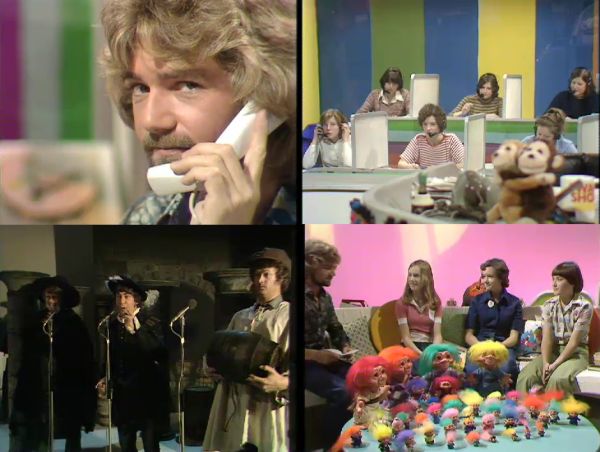 The telephone operators are hard at work, the Wurzels invent Horrible Histories, and a collection of trolls.
The telephone operators are hard at work, the Wurzels invent Horrible Histories, and a collection of trolls.
Swap Shop had a reputation as an unpredictable show. Noel would often take a camera on a very long lead, and walk out of the studio to drop in on the studio next door. "They're rehearsing It Ain't Half Hot Mum", or Little and Large, or whatever child-friendly show they could find. Not only is it unpredictable and exciting, but it also shows the BBC as a big family, and Television Centre as the most exciting location on the planet. The annual Star Awards proved a measure of popularity - was Adam Ant bigger than The Human League? Is Chris Wenner preferred to Simon Groom? Can anyone beat Christopher Reeve?
And there were competitions! Viewers could write in to win the Star Swap, offered by the guests on the show. The Odd Swap was a phone-in contest to win a prize live on air. Lucky Numbers was a phone-in contest - originally a standalone show at teatime, later a segment within Swap Shop. The games Noel played were often quite silly: "name twelve things in that film clip beginning with B". The prizes were equally ludicrous - a year's supply of bubble bath. Lucky Numbers was really an excuse to have a chat with star guests, and have them play along with Noel's daft but unthreatening games.
When he appeared on Desert Island Discs in 1978, Noel told Roy Plomley that he'd miss the company; the solitude of being cast away on a desert island would get to him. Noel had moved to Suffolk, and while he'd miss the greenery, he wouldn't miss London. He was already a farmer, with some cows and sheep on his smallholding. When he finally left Radio 1, it was just about the end of his radio career - a week sitting in for Mike Read in 1985, eight weeks as a substitute for Johnny Walker in 2003, and no other regular gigs.
Noel was also making some steps into television for adults. Building on his racing experience, he was the first host of consumer motoring programme Top Gear, which has been consigned to television obscurity. Taking the Strain was an informative series about stress and its treatments. After leaving Swap Shop, Noel had an evening show The Time of Your Life, where he'd take people (famous forever, or just for five minutes) back to a memorable month in their life. The flood of memories we'd come to expect from This Is Your Life is mixed with entertainment performances and a human story told in a compelling way.
But Noel's big project was another live Saturday show - this time, the other side of the day. The Late Late Breakfast Show was BBC1's big launch for autumn 1982. Next week, we'll trace the fortunes of that show, and how the basic format would dominate Saturday evenings for almost two decades.
In other news...
The death of Herb Stempel, aged 93. He did more than anyone else to ensure that quiz shows were fair and honest.
As a contestant on NBC's primetime quiz Twenty-One, Stempel was coached to make perfect television. First to win almost $50,000 (then £17,900; about 9 years' average salary), and later to lose to Charles van Doren. Herb Stempel would later expose the plot to the public and government, saying how he'd been cast as the nerdy square and given a dowdy suit to wear. He'd also been coached in the producer's favourite stagecraft - biting his lip, mopping his brow, pauses and sighs. Most of all, he'd been told the questions in advance, and what responses to give. Twenty-One wasn't a quiz show as we know it, Stempel and van Doren and others were actors in a play; Stempel described his actions as "not illegal, but it wasn't quite kosher".
As a direct result of Stempel's disclosure, it was made illegal to rig quiz shows. The disclaimers common to North American shows - "parts of this programme not affecting the outcome were edited" - are his legacy. Stempel was a quiz show star in his youth, winning many episodes of Americana Quiz on local radio - his prize was an Eversharp fountain pen every week. He went on to work with Robert Redford on Quiz Show, the 1994 movie of the scandal. In civilian life, Stempel became a high school social studies teacher in New York and later worked for the New York City Department of Transportation. He died in a nursing home on 7 April; his death was not announced until the end of May.
BAFTA awards are looming. Game shows and people nominated this year are:
- Comedy Entertainment Programme - Taskmaster
- Entertainment Performance - Lee Mack for Would I Lie to You?
- Entertainment Programme - The Greatest Dancer, The Rap Game, Strictly Come Dancing, The Voice
- Features - Snackmasters
- Reality and Constructed Factual - Race Across the World, Rupaul's Drag Race
- Must See Moment - "Michael moves on from Amber" on Love Island
- Entertainment Craft Team - Strictly Come Dancing (David Bishop, Vicky Gill, Andy Tapley, Patrick Doherty), Love Island (Mark Busk-Cowley, Steve Kruger, Iain Stirling, James Tinsley)
The awards will be presented by Richard Ayoade In A Computer Screen on 31 July, except for the Entertainment Craft Team, which will be awarded on 17 July.
RTS Scotland awards were given out on 3 June, and it's great news for Swashbuckle, winner in the Childrens category. In Daytime, Kirstie's Celebrity Craft Masters lost out to (er) Kirstie's Handmade Christmas.
Best of the Web We've enjoyed Tell Them What They've Won, a series of 30 minute podcasts on the Great American Game Shows. We all know Family Fortunes and we've recently seen The Price Is Right, but who knew there was anything to say about The Pyramid Game? Here's the podcast feed, or subscribe on your favourite platform.
Have I Got Video Editing For You. A behind-the-scenes on how James Branch of Hat Trick productions edited the recent series of Have I Got News for You. It's quite technical and nerdy, and no less compelling for that.
Some actual new shows on Channel 4, with Four in a Bed and Come Dine with Me back for your teatime entertainment. Other quizzes have been in repeats for months on end, and we're pleased to see some new programmes.
Nostalgia of a different kind on Big Brother Best Shows Ever (E4, Sun-Thu), Davina McCall and Rylan Clark-Neal present some of their favourite episodes. There's another chance to catch Love Island Down Under (ITV2, from Mon).
On Radio 4, a new series of The Unbelievable Truth (Mon). And, for what we fear will be the last time, a new episode of Eggheads (BBC2, Mon).
Photo credits: RTL English Service, BBC, NBC. Video courtesies: The Phantom Zone, Classic New CBBC, Charlie Mouse 1234, S Crutley.

